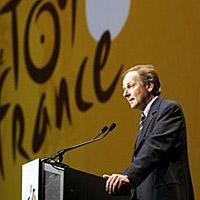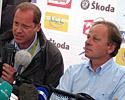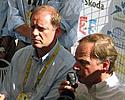News feature: September 18, 2007
The great divide
An interview with Patrice Clerc
Amid the flurry of planning that goes on this time of year, one important bit of negotiating for the 2008 season has stalled out completely, and it's perhaps the most important one facing the sport: the relations between the UCI and the Tour de France organisers, Amaury Sport Organisation (ASO). Cyclingnews' Hedwig Kröner caught up with ASO president Patrice Clerc about the UCI/ASO battle and found that the only thing going on between the two organisations is tension.
 |
2007 has been a turbulent season for professional cycling: from the ongoing Operación Puerto fall-out bringing down stars like Jan Ullrich and Ivan Basso, to the battle over Alejandro Valverde's participation at the World Championships, to doping confessions and tell-all accounts by current and former professionals, to doping positives and 'non-negatives' springing up throughout the season, and the whole Unibet.com debacle - it's been a rough year. But perhaps equally as dangerous to the future of the sport is the dissolving relationship between the Grand Tour (GT) organisers and the sport's governing body, the UCI.
The UCI and Grand Tour organisers came into conflict with the conception of the ProTour, and the tensions have only risen with this three year old series. The GT's complained about being forced into having their races as part of a series and told which teams they could invite, while the UCI struggled to maintain control over the fledgling concept. After two years of polemics, the battle came to a head before the first ProTour race of the season, Paris-Nice, nearly stopping the ProTour in its tracks when the ASO threatened to run the race under sanctioning of the French Cycling Federation.
The ASO had refused to formally invite UCI president Pat McQuaid to the Tour even before it sat in shock while watching its crowning glory, the Tour de France, be tainted by several unheard-of scandals, but the sequence of events during the Tour only served to make matters worse. After all, the bearer of the maillot jaune was expelled from the race for whereabouts discrepancies which the UCI was well aware of, and the doping positive of Patrik Sinkewitz would have become public while he was racing the Tour had he not crashed out first. The resulting withdrawal by German television of its live broadcast was another slap in the face for the ASO, which values its television contracts quite highly.
"My feeling is that of great anger, because I ask myself why these things happened, [and] my conclusion is: never again. We will never again accept this."-Clerc still feels angry toward the UCI over Rasmussen and Sinkewitz |
"I found it incoherent, to say the least, and somewhat hasty," said Clerc of the Germans' decision. "They punished the race organiser's will to clean up the sport. We took a very strong stance and measures which led to the multiplication of anti-doping controls prior to the Tour de France. We financed part of this. And the fact that a rider was found positive shows that a good job was done. My only regret is that this positive result was not made public before the race - and you may ask yourself why."
The late nights and stress-filled days of the second half of the Tour blew up into a series of emotion-filled exchanges between the two organisations. "It's true that our exchanges during and after the Tour de France were pretty violent," Clerc told Cyclingnews, referring to statements by his organisation that accused UCI president Pat McQuaid of wanting to hurt the Tour de France by failing to reveal that Michael Rasmussen had missed two out-of-competition anti-doping tests prior to the event. Clerc said that the UCI had not explained its decision to let the rider participate in the race to ASO since the Tour ended. "After the Tour, there was a communiqué [from the UCI] which personally attacked myself and Mr. Prudhomme. It was very violent wording; some kind of revenge. Press releases exist to announce something, not to avenge something."
Frustration and anger
 |
Looking back on the Tour de France, Clerc explained that two dominant feelings prevailed for him. "First, I retain the feeling of a terrible frustration. The start in London and the passage through Belgium were marvelous, the route was very attractive and allowed for a real suspense until the end. But this Tour de France, that could have done a lot of good to cycling, was damaged by events that should and could have been prevented.
"The first doping affair - Sinkewitz - should not have been revealed during the Tour de France, but well beforehand. Sinkewitz should have never participated in the race. Then, Rasmussen's missed anti-doping tests should have been brought to our attention before the race, too: we should have been made aware of it. The UCI should have applied its regulation, which it didn't. I don't understand why this existing regulation was not applied!"
For his part, McQuaid claimed that he had no knowledge of Rasmussen's exclusion from the Danish national team federation until he was asked for his reaction by a journalist. He rejected any suggestions that the UCI were involved in the decision to release this dramatic news during the Tour de France.. However, Clerc still blames the UCI for not keeping to its promises to help clean up the sport. "Before the race, the teams, the UCI and ourselves had sealed a pact to make the race as clean as possible," Clerc recalled. "There is a photograph showing M. Prudhomme, M. McQuaid and M. Lefevere solemnly shaking hands with the aim of making the Tour exempt of all doubt and reproach.
"But neither the team nor the UCI told us that this particular rider - of which we all knew that he would be an important actor in the race, notably in the mountains, was doubtful. We had sealed a real pact, and nobody found it necessary to inform us! Only to reveal in the middle of the race that Rasmussen, who was wearing the maillot jaune, was suspended from the Worlds by his own federation! I felt a very big frustration, because this should never have happened: he should never have participated in the first place!"
Clerc still blamed the UCI for the turn of events in July. "My second feeling is that of great anger, because I ask myself why these things happened," he continued. "So my conclusion is: never again. We will never again accept this. After experiencing what we had to experience during the Tour, and seeing the total fiasco of today's organisation of professional cycling and its team selection, we want to study all other possibilities."
Since then, Clerc said he hasn't had any resolution to the issues. "We don't have any contact with the UCI at the moment," he said, but there is hope on the horizon, as newly-elected French Health and Sports minister Roselyne Bachelot is organising an anti-doping summit in Paris on October 22 and 23, where both camps will sit down at one table. "Our Sports and Health minister has decided to take a significant initiative to try and bring the various parties together again," he explained.
"The idea came from WADA, and after [Bachelot] met with WADA president Richard Pound, she decided to arrange this meeting as soon as possible. She wants to come to a consensus on the anti-doping measures to be applied to the riders and the teams, so that everyone agrees at least on this particular point. Over and above our political problems regarding the organisational principles of the sport, we will of course contribute to this summit - for the sake of cycling, and notably the Tour de France. But at the moment, our contacts with the UCI are as scarce as ever."
The sticky issue of the ProTour
 |
Looking back on the latest chapter in the long ongoing feud regarding the ProTour, the ASO president described one event which he found particularly irritating. "There was quite a brutal cut with the UCI one day before the Tour de France," he said. "On March 5, a convention had been established between the UCI, ASO, the teams and other organisers to find a solution before the end of the 2007 season. The discussions were difficult, but there was a certain progress even if it wasn't as fast as we wanted.
"Then, in June, at a meeting of the CUPT (UCI ProTour Council), the UCI issued a communiqué saying that our races would be part of the ProTour calendar in 2008 - and this is not acceptable in our view. It was never foreseen in our agreements! Our agreements clearly state that we are not included in the UCI ProTour, and that the ProTour cannot mention our races in any way. So if you ask me if a dialogue with the UCI is possible - on this basis, it is clearly not."
"Every time we found some acceptable common grounds, it was put in the trash."-Clerc does not believe that ASO will come to terms with the UCI anytime soon. |
In the past, the UCI attributed points to its ProTour classification from the events organised by ASO, but Clerc insisted that this always happened against the will of his organisation. "From the first day on, we have always said that our races weren't part of the ProTour, and that they couldn't be used in any way to give the impression to the cycling community that we were part of it. Which is why we refused to have the ProTour leader's jersey ceremony carried out at our races. Other organisers can of course organise this ProTour if they want, but not with us. And they can't decide in this authoritarian manner that we participate in this system."
At the end of the season, several ProTour team licenses may be available as at least two teams (Unibet and Discovery Channel) will cease to exist and Astana stands a chance of losing its license for multiple doping positives. Would a ProTour with only 18 teams help the ASO accept the ProTour? "Let me remind you that the ProTour was imposed on us against our view in 2004," Clerc replied. The two organisations have come close to agreements in the past, the limit of 18 teams was one item the GT's insisted on, but the UCI failed to live up to that expectation and gave out 20 licenses for the 2007 season.
Clerc remains pessimistic that things will change anytime soon. "I don't believe that the UCI will propose something different to us at this point. Every year, we negotiated, but we never found an agreement! The UCI doesn't stop saying that it is us who refuse to assent, but the only proposal that the UCI offers is: 'Join the ProTour and we will see afterwards.' But since the beginning, we don't want to be part of it, and ask to find a different solution - they don't want to. Every time we found some acceptable common grounds, it was put in the trash. Now, if the UCI changes its opinions, its government, its direction - maybe then things could be different."
Into the future
So what exactly are ASO's plans for team selection next year? In August, there had been talk of coming back to national teams for 2008. "The reintroduction of national teams is one proposal of many. But I think that it is an idea that would be very difficult - if not impossible - to realize. On the other hand, I would not be opposed at all to the participation of some national teams in the Tour de France," Clerc said, leaving the door open for speculation. "Once we have examined all the prospects, we will approach the teams and the sponsors with our ideas."
But Clerc insisted on one important point, as the organisers of the Tour de France will do everything in their power to prevent doping scandals similar to 2007 in the future. "One of the team selection criteria, which will pre-empt all others, will definitely be of ethical nature," he added. "There will be a clear distinction with what I have seen these last three or four years, where the criteria were first of all of economical nature: our first bench mark will be doping-related. This measure will precede all other selection criteria."
Clerc was not sure whether he would be able to announce its plans for 2008 at the official presentation of the Tour de France on October 25. "It would be preferable, but I can't say today whether we will be ready by then. We'll announce our decisions once we're ready."

